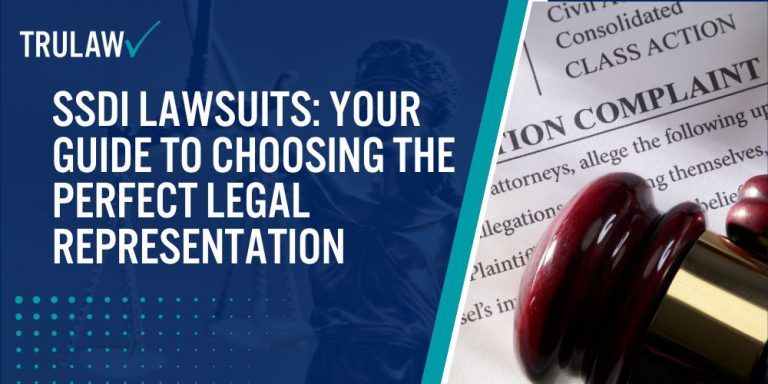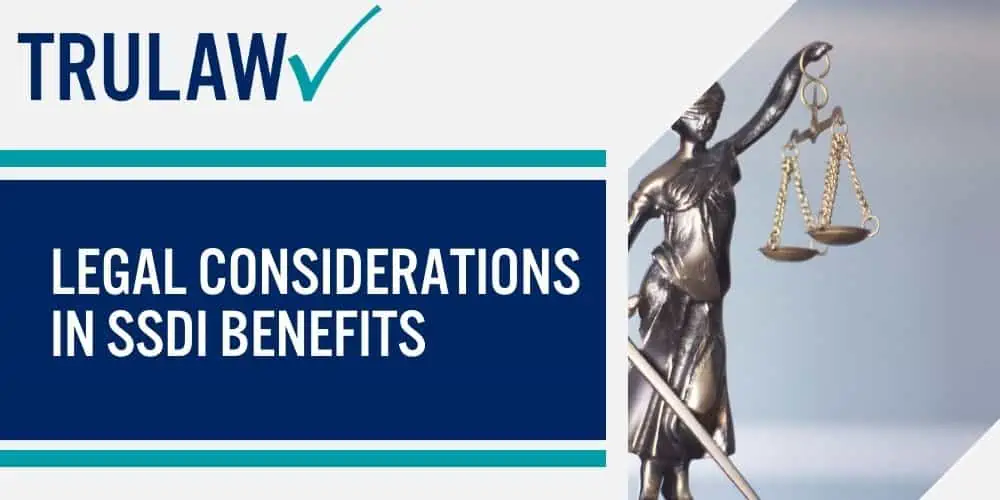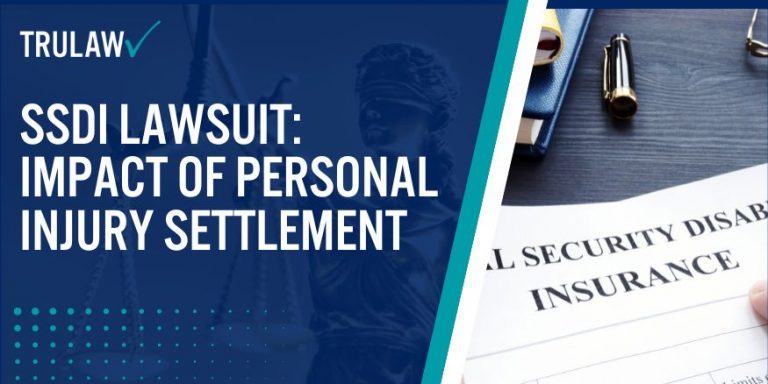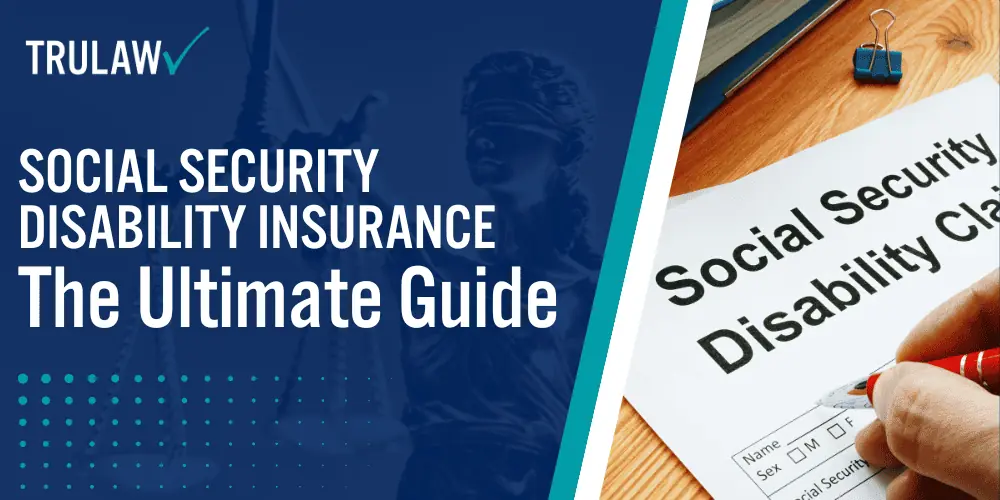SSDI Lawsuits: Your Guide to Choosing the Perfect Legal Representation
- Last Updated: July 9th, 2024

Attorney Jessie Paluch, founder of TruLaw, has over 25 years of experience as a personal injury and mass tort attorney, and previously worked as an international tax attorney at Deloitte. Jessie collaborates with attorneys nationwide — enabling her to share reliable, up-to-date legal information with our readers.
Legally Reviewed
This article has been written and reviewed for legal accuracy and clarity by the team of writers and legal experts at TruLaw and is as accurate as possible. This content should not be taken as legal advice from an attorney. If you would like to learn more about our owner and experienced injury lawyer, Jessie Paluch, you can do so here.
Fact-Checked
TruLaw does everything possible to make sure the information in this article is up to date and accurate. If you need specific legal advice about your case, contact us by using the chat on the bottom of this page. This article should not be taken as advice from an attorney.
Key takeaways:
- SSDI lawsuits, or Social Security Disability Insurance lawsuits, represent a legal entitlement under Title II of the Social Security Act.
- Class action lawsuits within the context of Social Security Disability Insurance (SSDI) are legal proceedings where a group of people, all claimants, file a lawsuit collectively.
- Participation in class action suits can offer several advantages for claimants.
SSDI Lawsuits: Your Guide to Choosing the Perfect Legal Representation
Understanding the intricacies of Social Security Disability Insurance (SSDI) lawsuits can be a challenging task.
It is crucial to have specialized legal representation in such cases, as the impact it can have on the final verdict is substantial.
A disability attorney, well-versed with the workings of hearing offices and possessing expertise in employment eligibility criteria, can dramatically change the course of a case.
When selecting an attorney for these cases, a few key factors should be considered.
Firstly, their comprehension of agency administration is essential.
They should be familiar with the ins and outs of the administrative processes involved in SSDI lawsuits.
This understanding allows them to navigate the system effectively and ensure that all necessary procedures are followed correctly.

Secondly, the attorney’s grasp of employee relationship dynamics is vital.
They should understand the complexities of the relationships between employers and employees, and how these dynamics can affect the case.
This knowledge can provide valuable insights into the case and help them build a strong defense for their client.
Lastly, the attorney’s understanding of constitutionality issues is of paramount importance.
They need to be aware of the constitutional rights of their clients and how these rights can be leveraged in the case.
This understanding allows them to ensure that their client’s rights are not violated and that they are treated fairly throughout the process.
Table of Contents
Understanding SSDI Lawsuits: An Introduction
What are SSDI Lawsuits?
SSDI lawsuits, or Social Security Disability Insurance lawsuits, represent a legal entitlement under Title II of the Social Security Act.
They serve as a means for individuals who have been denied their application for SSDI benefits to challenge the decision in court.
The main purpose of these lawsuits is to ensure that individuals who are unable to work due to a disability claim can secure the financial assistance they need.
Reasons for Filing an SSDI Lawsuit
Here are several common reasons why someone might file an SSDI lawsuit:
- The existence of an error in the computation of their disability benefits.
- A disagreement with the vocational guidelines used by the SSA (Social Security Administration) during the application process.
- A belief that there was insufficient oral inquiry during their hearings level review.

Process and Timeline
An SSDI lawsuit typically starts with a federal court complaint after exhausting all administrative appeals.
Both parties then share pertinent case information such as medical records and employment history.
A hearing follows where arguments are presented to a judge who then decides based on federal law.
The timeline for this process, influenced by factors like court backlog and case complexity, ranges from several months to over a year.
Consequences for Claimants and Defendants
For claimants, winning an SSDI lawsuits may result in receiving back payments for past due benefits, ongoing monthly payments, and potentially even coverage of attorney’s fees.
On the other hand, losing could mean continued denial of benefits without any offset possibility.
It also means bearing costs associated with litigation such as attorney’s fees and court costs.
For defendants, typically the SSA, a loss could result in having to pay out substantial benefits.
A win would uphold their original decision and require no additional payments.
Legal Representation in SSDI Lawsuits
SSDI Attorneys can provide essential representation in SSDI lawsuits.
The law is a complex entity, with numerous provisions and regulations that can be challenging for the average person to navigate.
Here, attorney services come into play. They have the expertise and experience to interpret these laws effectively.
Role of Attorneys
The role of an attorney extends beyond understanding the law. They are instrumental in gathering evidence and building a case.
It’s not uncommon for attorneys to work closely with their staff and use office resources to collect all necessary documentation.
This may include medical records, employment history, or any other relevant information that strengthens your case.
Moreover, attorneys shoulder significant responsibilities during the negotiation or trial phase.
Whether it’s before an administrative law judge at a state court or during administrative appeals at an appeals council, they represent your interests zealously.
Their service doesn’t end there; they also handle all communication with the SSA, ensuring you’re well-informed about your case’s progress.

Lawyers’ Responsibilities
Lawyers during negotiations or trials must effectively present cases, cross-examine witnesses, answer the judge’s queries, and debate legal issues.
This necessitates a solid understanding of social security law and procedural regulations for administrative or appellate hearings.
Impact on Outcome
Legal representation can significantly impact SSDI lawsuit outcomes due to attorneys’ ability to navigate complex laws effectively and build strong cases based on gathered evidence.
Here are some of the representations:
- Better Understanding: Attorneys understand how courts interpret laws and use this knowledge to their advantage when representing clients.
- Proper Documentation: They ensure all necessary documents are collected and properly presented.
- Negotiation Skills: Experienced attorneys possess strong negotiation skills that can lead to favorable settlements without going through lengthy court proceedings.
- Trial Experience: If a case goes to trial, attorneys can use their experience and expertise to argue effectively on your behalf.
Attorney Fees
It’s important to note that attorney fees in SSDI lawsuits are usually contingent.
This means you only pay if you win your case.
The Social Security Act has a provision limiting the amount an attorney can charge for representation in court.
This makes legal services accessible even for those with limited financial resources.
The Role of Class Action Lawsuits In SSDI
Class action lawsuits within the context of Social Security Disability Insurance (SSDI) are legal proceedings where a group of people, all claimants, file a lawsuit collectively.
These individuals share common characteristics or experiences, most notably their struggle to gain equal access to SSDI benefits.
The purpose behind these collective legal actions is to address systemic issues that affect multiple individuals rather than isolated incidents.
Pros and Cons for Claimants
Participation in class action suits can offer several advantages for claimants.
Primarily, it allows the pooling of resources among numerous plaintiffs, thus reducing individual legal costs.
Moreover, it ensures consistency in court decisions and potentially leads to policy changes benefiting all affected parties.
However, there are also drawbacks.
A significant concern is that the compensation received may not adequately address an individual claimant’s unique circumstances or needs.
Once a decision is made in a class action suit, members typically cannot pursue individual claims on the same issue.
Comparing Class Actions with Individual Claims

Here are some class action suits differ significantly from individual claims in several ways:
- Scope: While individual claims focus on specific personal circumstances and injuries, class actions address broader systemic issues for disability claims.
- Legal Costs: Individual lawsuits can be expensive due to attorney fees and other related costs.
- Outcome: An unfavorable outcome in an individual claim affects only the plaintiff, whereas in a class action, it impacts all members of the group.
Protecting SSDI Benefits Post Lawsuit
Safeguarding Benefits
Winning a lawsuit can have implications on your Supplemental Security Income (SSI) benefits.
Here are some strategies that ensure these benefits remain intact:
- Keep detailed records of all monetary awards from the lawsuit.
- Consult with an experienced attorney who understands SSA policies.
- Set up a Special Needs Trust if the settlement is substantial in waiting period with expedited processing.
Understanding and adhering to SSA policy is key in safeguarding your benefits.
Threats to Benefits

Post-lawsuit, there may be attempts by the Social Security Administration (SSA) for overpayment recovery.
This could pose a threat to your SSDI benefits.
For instance, if you receive a significant amount from a lawsuit, the SSA might view this as overpayment and attempt to recover it by reducing or suspending your benefits.
It’s essential to be aware of such potential threats and take necessary measures to counteract them, such as seeking legal advice or contacting the SSA directly for clarification on their policies.
Role of Medical Evaluations
Ongoing medical evaluations play an important role in maintaining eligibility for SSDI benefits post-lawsuit.
The SSA often requires these evaluations to determine whether you still qualify for benefits based on your current health condition:
Schedule regular check-ups with your healthcare provider.
Keep all medical records up-to-date and readily available.
Notify the SSA immediately about any changes in your condition or treatment plan.
These steps will help ensure that you continue receiving SSI benefits as long as you are eligible under SSA policy.
Reporting Changes Promptly
Changes to your income, living conditions, or marital status can impact your SSDI Lawsuits and benefits. To prevent issues, promptly report such changes.
For instance, starting work or getting married post-lawsuit could lower your SSI benefits, and moving could alter your eligibility for state supplements.
Timely reporting ensures the accuracy of your SSDI Lawsuits benefits and compliance with SSA policies.
Notable SSDI Class-Action Lawsuits
Impact on Future Litigation Strategies
Case precedents play a vital role in shaping future litigation strategies:
- In estate cases like Secretary of Health and Human Services, the 1st Cir court ruled that a widow could claim SSDI benefits based on her husband’s disability.
- The Padro v Astrue settlement, which targeted SSA’s biased administrative law judges in New York, could serve as a blueprint for similar lawsuits in other states.
By understanding these notable SSDI class-action lawsuits, we can better navigate the complexities of disability law and ensure fair treatment for all beneficiaries.
Outcomes of Major SSDI Class-Actions

Impactful Lawsuits and Policy Changes
Several class-action lawsuits have led to significant policy changes and financial compensation.
For instance, the Richardson v. Perales case established that a physician’s report could be considered substantial evidence even if it wasn’t corroborated by clinical findings.
This case set a precedent for future SSDI cases, influencing litigation strategies.
Another impactful lawsuit was Sullivan v. Zebley, which resulted in changes to the eligibility criteria for children applying for SSDI benefits.
The Supreme Court ruled that the criteria were too stringent, leading to an increase in approved claims and a subsequent strain on the SSDI budget.
Influence on Litigation Strategies
These major lawsuits have shaped subsequent litigation strategies and claimant expectations:
- Lawyers now place greater emphasis on medical reports.
- Claimants anticipate higher chances of success due to loosened eligibility criteria.
The influence of these class actions extends beyond courtrooms; they also shape public opinion and media coverage.
Public Opinion and Media Coverage
Public opinion plays a crucial role in shaping lawsuit outcomes as well as policy changes:
- Media coverage of Sullivan v. Zebley highlighted the plight of disabled children, swaying public sentiment towards more lenient eligibility criteria.
- In contrast, media reports on increased SSDI spending following this case led to public scrutiny over potential misuse of funds.
This dual role of media – both as an advocate for claimants and a watchdog over SSDI administration continues to impact policies and perceptions.
Personal Injury Settlements Impact On SSDI Lawsuits
Personal injury settlements can have a significant impact on the eligibility for Social Security Disability Insurance (SSDI benefits).
The receipt of a personal injury settlement may result in an adjustment of the monthly SSDI benefits or even complete termination depending upon the nature and amount of the settlement.
Legal Considerations

There are several legal considerations when receiving both personal injury settlements and SSDI benefits.
For instance, if you receive a lump sum settlement from your personal injury case, it could be considered as income by the Social Security Administration (SSA).
This could potentially affect your eligibility for SSDI benefits.
The SSA has specific rules regarding how different types of compensation settlements are treated.
Here some of the examples:
- Compensation received for medical expenses is generally not counted as income.
- Compensation received for lost wages is usually counted as income.
Therefore, it’s crucial to understand these rules and consult with an attorney experienced in both personal injury and SSDI laws to avoid any potential pitfalls.
Reporting to SSA
Failure to properly report your personal injury settlement to SSA can lead to severe consequences.
Here are some things that might include:
- Overpayment of benefits: If you do not report your PI settlement, the SSA may continue paying you full benefits leading to overpayment.
- Fraud charges: If you intentionally fail to report your PI settlement, you could face fraud charges which carry heavy penalties including fines and imprisonment.
Thus, proper reporting is essential when dealing with both SSDI and PI settlements.
Minimizing Negative Impact
Here are the several strategies can help minimize the negative impact on SSDI benefits due to a personal injury settlement:
- Structured Settlements: Instead of taking a lump sum payment, consider opting for structured payments spread out over time.
- Special Needs Trust: Placing your compensation offset into a special needs trust can prevent it from being considered as income by SSA.
- Workers’ Compensation Offset: In some cases, you can reduce your SSDI benefits to avoid the workers’ compensation offset.
By carefully planning and taking appropriate steps, it’s possible to receive a personal injury settlement without jeopardizing your SSDI benefits.
However, this is a complex area of law and it’s advisable to seek professional legal advice to ensure compliance with all relevant laws and regulations.
Financial Changes And SSDI Benefits
Understanding the impact of financial changes on your disability insurance benefits is paramount.
If you’re a recipient of SSDI benefits, alterations in your income, assets, or living situation can significantly affect your benefit status.
For instance, an increase in employment income might reduce the amount of SSDI benefits you receive.
Prompt Reporting to SSA

It’s crucial to promptly report any financial changes to the Social Security Administration (SSA).
This includes changes in earnings, assets like a special needs trust, or even black lung benefits.
The SSA determines eligibility for disability benefits based on financial need among other factors.
Therefore, any change that affects your income should be reported immediately.
Here are the things to consider:
- Changes in employment income
- Receipt of additional compensation benefits
- Acquisition or disposal of significant assets
Failure to accurately or timely report these changes may result in severe consequences including penalties and overpayments.
Overpayments occur when you receive more SSDI benefits than you are entitled to due to unreported or inaccurately reported changes.
Periodic Reviews by SSA
The SSA conducts periodic reviews to adjust benefit amounts based on financial changes.
Here are the changes during these reviews:
- Your income including work deductions is evaluated.
- Your living arrangements are assessed.
- Any additional payments such as supplemental security income (SSI) are taken into account.
If there’s a substantial increase in your resources or earnings, it could lead to a reduction in your disability insurance benefits.
Consequences of Non-reporting

Here are the things in non-reporting and inaccurate reporting have serious implications:
- You may be required to pay back overpaid SSDI Lawsuits benefits.
- Your future SSI benefits could be reduced.
- In severe cases, criminal charges may be brought against you for fraud.
Wrapping Up: Concluding Thoughts on SSDI Lawsuits
Navigating the legal landscape of Social Security Disability Insurance (SSDI lawsuits) can be complex.
It is essential to understand the role of legal representation, class action lawsuits, and the impact of personal injury settlements on SSDI.

Furthermore, being aware of notable class-action lawsuits and their outcomes can provide valuable insights.
The protection of SSDI Lawsuits benefits post-lawsuit and understanding potential financial changes are crucial aspects that cannot be overlooked.
With this knowledge at your disposal, you are better equipped to make informed decisions regarding SSDI lawsuits.
For further assistance or clarification on any aspect discussed in this article, consider seeking professional advice from a legal expert in this field.
Frequently Asked Questions
-
What Is An SSDI Lawsuit?
An SSDI lawsuits refers to a legal case involving disputes related to Social Security Disability Insurance benefits.
-
Why Would Someone Need Legal Representation In An SSD Lawsuit?
Legal representation in an SSDI lawsuits can help navigate the complex laws surrounding these cases and ensure that one’s rights are adequately protected.
-
What Is A Class-Action Lawsuit In Terms Of SSDI?
A class-action lawsuit for SSDI involves multiple plaintiffs who have similar claims against a common defendant related to their disability benefits.
-
How Does a Personal Injury Settlement Impact My SSDI Benefits?
Personal injury settlements could potentially affect your eligibility for SSDI benefits depending upon the amount received and how it’s structured.
-
How Does One Protect SSI Benefits After A Lawsuit?
Protecting SSI benefits after a lawsuit often involves strategic planning with regard to asset management and income sources.
Consulting with an attorney experienced in such matters is recommended.

Experienced Attorney & Legal SaaS CEO
With over 25 years of legal experience, Jessie is an Illinois lawyer, a CPA, and a mother of three. She spent the first decade of her career working as an international tax attorney at Deloitte.
In 2009, Jessie co-founded her own law firm with her husband – which has scaled to over 30 employees since its conception.
In 2016, Jessie founded TruLaw, which allows her to collaborate with attorneys and legal experts across the United States on a daily basis. This hypervaluable network of experts is what enables her to share reliable legal information with her readers!
You can learn more about the Social Security Disability Insurance System by visiting any of our pages listed below:
Here, at TruLaw, we’re committed to helping victims get the justice they deserve.
Alongside our partner law firms, we have successfully collected over $3 Billion in verdicts and settlements on behalf of injured individuals.
Would you like our help?
At TruLaw, we fiercely combat corporations that endanger individuals’ well-being. If you’ve suffered injuries and believe these well-funded entities should be held accountable, we’re here for you.
With TruLaw, you gain access to successful and seasoned lawyers who maximize your chances of success. Our lawyers invest in you—they do not receive a dime until your lawsuit reaches a successful resolution!
Do you believe you’re entitled to compensation?
Use our Instant Case Evaluator to find out in as little as 60 seconds!
Camp Lejeune’s water contamination issue spanned several decades starting in the 1950s. Exposure to these chemicals has been linked to various serious health issues, including cancer, organ diseases, and death.
Research is increasingly suggesting a link between the use of Tylenol during pregnancy and the development of neurodevelopmental disorders, such as autism and ADHD, in infants.
Legal action is being taken against manufacturers of Aqueous Film-Forming Foam (AFFF), a chemical used in fighting fires. The plaintiffs allege that exposure to the foam caused health issues such as cancer, organ damage, and birth and fertility issues.
Here, at TruLaw, we’re committed to helping victims get the justice they deserve.
Alongside our partner law firms, we have successfully collected over $3 Billion in verdicts and settlements on behalf of injured individuals.
Would you like our help?


